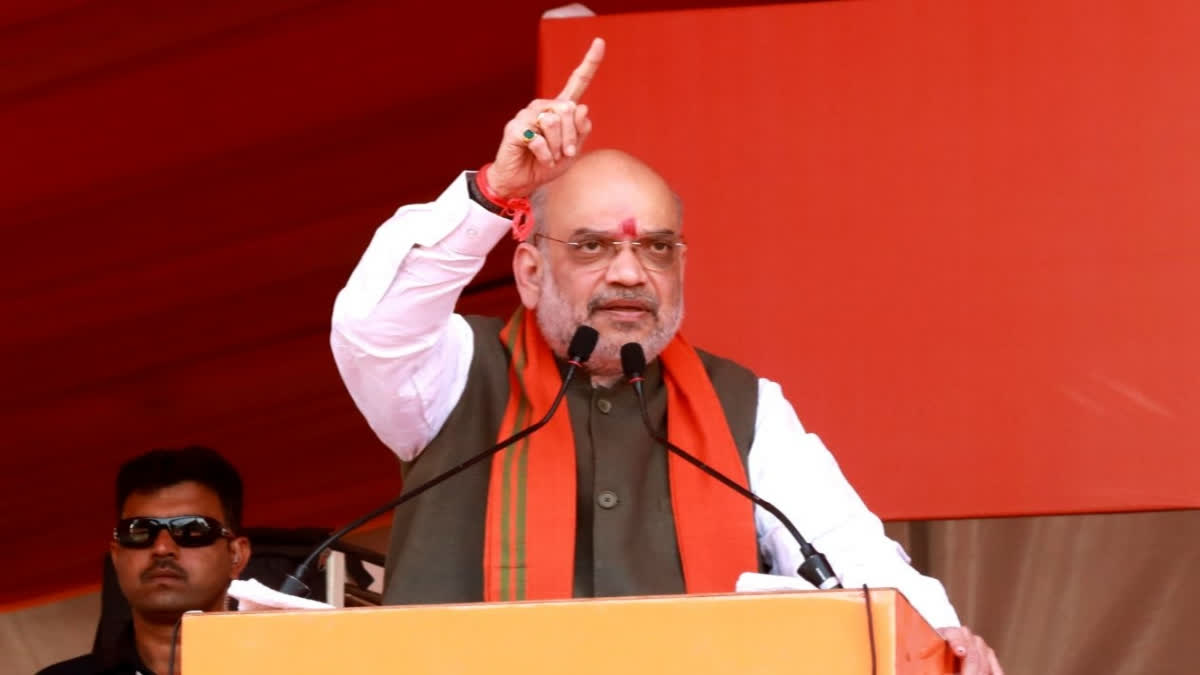New Delhi: Cooperation Minister Amit Shah on Wednesday launched IFFCO's nano liquid DAP fertiliser for commercial sale at Rs 600 per 500 ml bottle and exhorted farmers to use nano urea and DAP extensively to make the country self-reliant and reduce import dependence.
One bottle (500 ml) of nano liquid DAP (Di-ammonium phosphate) is equivalent to one bag (50kg) of conventional granular DAP, which is currently being sold at Rs 1,350. In June 2021, Indian Farmers Fertiliser Cooperative Ltd (IFFCO) launched the world's first nano urea fertiliser and now it has developed nano DAP.
IFFCO's nano DAP fertiliser was approved by the Agriculture Ministry and notified in the Fertiliser Control Order (FCO) in March this year based on its encouraging results. Addressing the event, Shah said, "Launch of IFFCO's nano liquid DAP is an important beginning towards becoming self-reliant in the fertiliser sector". The minister expressed concern over the impact of excessive use of conventional chemical fertilisers on soil quality and the health of people.
Shah said the use of IFFCO Nano DAP will enhance both the quality and quantity of crop production and improve soil health as the liquid fertilisers are sprayed on plants. The use of nano fertilisers will contribute a lot in restoring fertility of land and also reducing the threat to the health of crores of Indians caused by chemical nutrients, he added. Shah lauded the efforts of IFFCO in innovating the world's first nano-liquid urea and DAP.
The minister noted that 60 per cent of India's population is associated with agriculture and related activities and this "revolutionary development" will help the country become 'Atmanirbhar' in the field of fertilisers. The use of nano urea and nano DAP will lead to a reduction in imports as well as the government's fertiliser subsidy bill, he said, adding that nano fertilisers can be easily stored and transported.
The government provides subsidy on conventional DAP but it will not give any subsidy on nano DAP. So, there will be saving in government's subsidy. There is no subsidy on nano urea as against conventional urea, which is highly subsidised. The government's fertiliser subsidy bill was Rs 2.25 lakh crore in 2022-23. Shah also said the use of nano DAP can help farmers in reducing expenditure on crop production by 6 to 20 per cent.
He urged farmers to use nano urea as well as DAP extensively and asked them not to use both conventional and nano fertilisers at the same time. Shah said the use of nano fertilisers will also help farmers in adopting natural (chemicals-free) farming in a big way. The minister highlighted that the IFFCO has got a patent for their nano urea and nano DAP for 20 years, and the cooperative will get royalty for the use of the products.
IFFCO is likely to produce 18 crore bottles of nano DAP by 2025-26, which will lead to a reduction of the use of 90 lakh tonne of conventional DAP, Shah said. In a statement, IFFCO said it has set up manufacturing facilities for the production of nano DAP fertilisers at Kalol, Kandla in Gujarat and Paradeep in Orissa. Production at Kalol Plant has already started and this year 5 crore bottles of nano DAP liquid, equivalent to 25 lakh tonnes of DAP, will be produced.
Nano DAP contains 8 per cent nitrogen and 16 per cent of phosphorus in a bottle. IFFCO further said has sold 5.44 crore bottles of nano urea since August 2021. Its Chairman Dileep Sanghani said nano DAP has been made in line with Prime Minister Narendra Modi's vision of "Sahkar se Samriddhi and Atmanirbhar Bharat" with the aim of increasing farmer's income and providing them with a better future. IFFCO's MD US Awasthi said the "nano DAP has been found to be very effective in enhancing the nutritional quality and productivity of crop and has a huge positive impact on the environment thus resulting in significant reduction in global warming.
In 2021-22, India imported 91.36 lakh tonne of urea, 54.62 lakh tonne of DAP, 24.60 lakh tonne of MoP (muriate of potash) and 11.70 lakh tonne of NPK fertilisers. Urea is provided to the farmers at a maximum retail price (MRP) of Rs 242 per 45 kg bag fixed by the Centre. The difference between the production cost and retail price is reimbursed to the manufacturers as subsidy. The Centre is implementing a Nutrient Based Subsidy (NBS) policy with effect from April 2010 for Phosphatic and Potassic (P&K) fertilisers. Under the policy, a fixed amount of subsidy is provided on P&K fertilisers depending on their nutrient content. The MRP of P&K fertilisers is fixed by manufacturers. (PTI)



